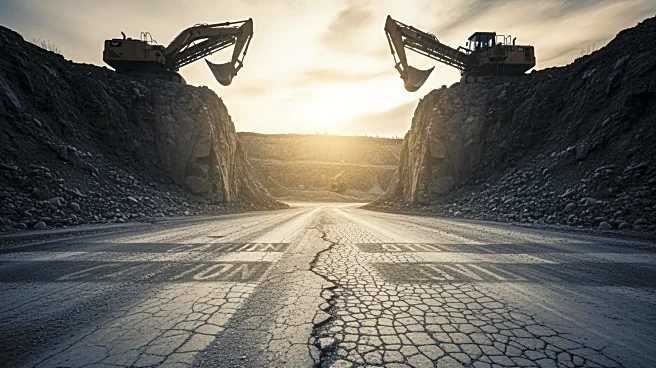What's Happening?
China's Ministry of Commerce has clarified its recent rare earth export controls following backlash from President Trump, who viewed the controls as a violation of a previous trade agreement. The new restrictions prohibit U.S. defense contractors from receiving
Chinese rare-earth materials and require foreign entities to have a license to export products containing more than 0.1 percent of these minerals. China accounts for over two-thirds of global rare earth output, which is crucial for technologies like electric vehicle motors and semiconductors. The U.S. has responded with its own export restrictions and industrial incentives to counter China's dominance in this field.
Why It's Important?
Rare earths are essential for various high-tech industries, and China's control over their supply poses a strategic challenge for the U.S. The new export controls could disrupt supply chains and impact U.S. defense and technology sectors. President Trump's threat of a 100 percent tariff on Chinese goods further escalates the trade tensions, potentially affecting global markets. The situation underscores the geopolitical significance of rare earths and the ongoing competition between the U.S. and China for technological and economic supremacy.
What's Next?
Despite the trade tensions, President Trump is expected to meet with Chinese President Xi Jinping at the Asia Pacific Economic Cooperation forum later this month. This meeting could provide an opportunity for both leaders to negotiate and potentially ease the trade conflict. However, the outcome remains uncertain, as both countries have taken firm stances on their respective policies. The U.S. may continue to pursue alternative sources for rare earths and strengthen its domestic production capabilities to reduce reliance on Chinese imports.
Beyond the Headlines
The rare earth dispute highlights broader issues of resource control and international trade dynamics. China's export controls reflect its strategic use of resources to exert influence and protect national interests. The situation may prompt other countries to reassess their resource dependencies and explore diversification strategies. Additionally, the environmental impact of rare earth mining and processing remains a concern, as countries balance economic interests with sustainability goals.















